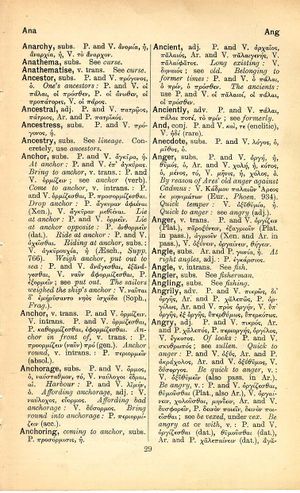ancient: Difference between revisions
From LSJ
ὁ δὲ μὴ δυνάμενος κοινωνεῖν ἢ μηδὲν δεόμενος δι' αὐτάρκειαν οὐθὲν μέρος πόλεως, ὥστε ἢ θηρίον ἢ θεός → a man who is incapable of entering into partnership, or who is so self-sufficing that he has no need to do so, is no part of a state, so that he must be either a lower animal or a god | whoever is incapable of associating, or has no need to because of self-sufficiency, is no part of a state; so he is either a beast or a god
(Woodhouse 2) |
(CSV3) |
||
| Line 1: | Line 1: | ||
{{ | {{Woodhouse1 | ||
| | |Text=[[File:woodhouse_29.jpg|thumb|link={{filepath:woodhouse_29.jpg}}]]'''adj.''' | ||
P. and V. [[ἀρχαῖος]], [[παλαιός]], Ar. and V. [[παλαιγενής]], V. [[παλαίφατος]]. | |||
<b class="b2">Long existing</b>: V. [[δηναιός]]; see [[old]]. | |||
<b class="b2">Belonging to former times</b>: P. and V. ὁ [[πάλαι]], ὁ [[πρίν]], ὁ [[πρόσθεν]]. | |||
<b class="b2">The ancients</b>: use P. and V. οἱ παλαιοί, οἱ πάλαι, οἱ [[πρόσθεν]]. | |||
}} | }} | ||
Revision as of 09:20, 21 July 2017
English > Greek (Woodhouse)
adj.
P. and V. ἀρχαῖος, παλαιός, Ar. and V. παλαιγενής, V. παλαίφατος.
Long existing: V. δηναιός; see old.
Belonging to former times: P. and V. ὁ πάλαι, ὁ πρίν, ὁ πρόσθεν.
The ancients: use P. and V. οἱ παλαιοί, οἱ πάλαι, οἱ πρόσθεν.

